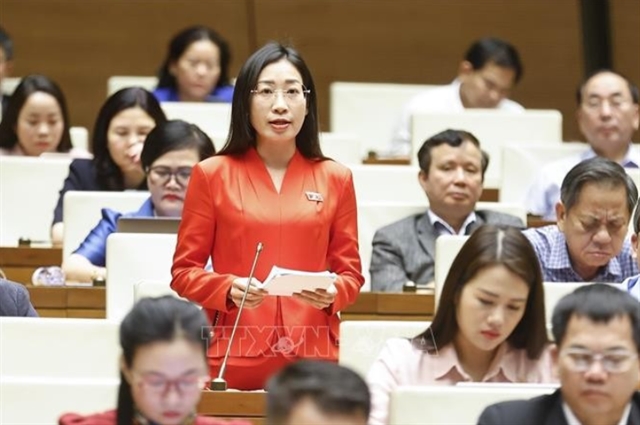 Politics & Law
Politics & Law


|
| Hoàng Thị Thanh Thúy, a deputy from the southern province of Tây Ninh, speaks at the National Assembly's discussion of the draft Law on E-commerce in Hà Nội on Thursday. — VNA/VNS Photo |
HÀ NỘI — The National Assembly on Thursday afternoon discussed the draft Law on E-Commerce, with several deputies calling for stronger measures to protect the rights and safety of children on e-commerce platforms.
Deputy Trịnh Thị Tú Anh from the central province of Lâm Đồng noted that with over 90 per cent of children aged six to seventeen using the Internet and smart devices for at least one hour a day, about fifteen million “digital citizens” are growing up alongside smartphones, e-commerce platforms, and AI algorithms that may know their preferences better than their parents. This group, she said, is both a potential customer base and one of the most vulnerable users of e-commerce platforms.
She proposed adding a specific article on responsibility to protect children in e-commerce, assigning clear legal obligations to major platform operators.
Among the principles she outlined were a complete ban on advertising based on the personal data, behaviour, or location of underage users; default privacy settings for child accounts, with options allowing children and parents to control real-time display and avoid algorithmic personalisation; and the creation of child-friendly reporting mechanisms for inappropriate content or behaviour.
Sharing a similar view, Nguyễn Thị Việt Nga, a deputy from the northern port city of Hải Phòng, said the draft law currently lacks specific provisions to protect children when they participate in livestream sales.
She suggested that e-commerce platforms be required to classify livestream content by age, display warning notices for sensitive or harmful material, and ensure the removal of content inappropriate for minors.
Hoàng Thị Thanh Thúy, a deputy from the southern province of Tây Ninh, commented that the current article on the obligation to avoid providing false information during livestreams has yet to clarify pre-broadcast control mechanisms for goods that could affect public health. The provision requiring livestream data to be stored for at least one year may also be insufficient in cases where dispute resolution or investigations of violations take longer, she added.
Thúy proposed adding pre-broadcast review mechanisms for livestreams advertising product benefits, especially for items that impact health, such as dietary supplements and cosmetics.
Deputy Bế Trung Anh from the Mekong Delta province of Vĩnh Long recommended including a new clause requiring that data authentication and storage comply with the principle of data minimisation, collecting only the information necessary for transactions and sharing it only when there is a clear legal basis to do so. — VNA/VNS




